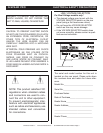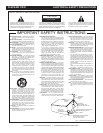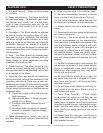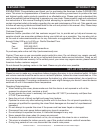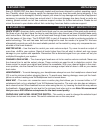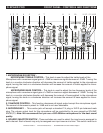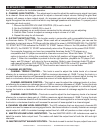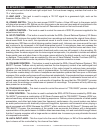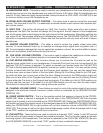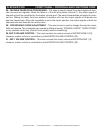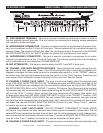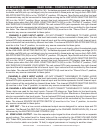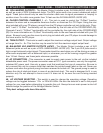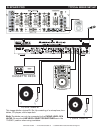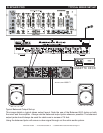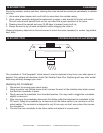
©American Audio® - www.americanaudio.us - Q-SPAND PRO Instruction Manual Page 11
Q-SPAND PRO FRONT PANEL - CONTROLS AND FUNCTIONS CONT.
19. HEADPHONE JACK - This jack is used to connect your headphones to the mixer allowing you to
monitor the cue source. Use headphones only rated at 8 ohms to 32 ohms. Most DJ headphones are
rated at 16 ohm, these are highly recommended. Always be sure the CUE LEVEL VOLUME (23) is set
to minimum before you put the headphones on.
20. ZONE LEVEL VOLUME OUTPUT CONTROL - This rotary knob is used to control the zone level
volume. The zone level is not PFL, it is essentially a second master output volume with separate out
-
put volume control.
21. SPLIT CUE - This button will activate the "Split Cue" function. When used with a set of stereo
headphones, the Split Cue function will assign the Cue signal to the left channel of the headphones
and the Program (main output) signal to the right channel of the headphones. Essentially splitting the
cue signal in half. This process will allow for headphones mixing. The CUE MIXING CONTROL (24) will
also work in conjunction with function. Please note that this function will only work with a set of stereo
headphones.
22. MASTER VOLUME CONTROL -
This slider is used to control the master output level (main
volume). To avoid distorted output try to maintain an average output signal level no greater than +4
dB. To avoid speaker damage that may be caused by excessive volume, be sure this slider is always
set to zero (completely down) before turning the unit on.
23. CUE LEVEL VOLUME CONTROL -
This knob is used to adjusts the headphone volume output
level. Turn the knob in a clockwise direction to increase the headphone volume.
24. CUE MIXING CONTROL - This functions allows you to monitor the Cue level as well as the
Program (main output) level in your headphones. A channels Cue Level may only be monitored if the
channels CUE (27) function is selected. To select a channels cue function press the CUE BUTTON
(27) that is directly associated with the specific channel you wish to monitor. You may use the mixing
function to blend both the Cue level and the Program level together. You can vary the output level
to either hear more or less of either of the two levels. Sliding the Cue Mixing fader to the CUE posi
-
tion (left) will allow you to hear more of the Cue level. Sliding the knob to the PGM position (right) will
allow you to hear more of the Program level (main output). You may also use the Cue Mixing Control
to hear either the Cue level or the Program level exclusively. If the fader is in the full CUE position you
will only hear the cue level, if the fader is in the full PGM position you will only hear the main output.
This function is especially useful when mixing without an monitor.
25. CHANNEL VOLUME FADER -
These faders are used to control the output signal of any source
assigned to its particular channel. However, master volume is controlled by the MASTER VOLUME
CONTROL (22).
26. FADER ASSIGN SWITCH - This is a five position switch that assigns a channel to the CROSS-
FADER (28). When a channel is assigned to the left side of the CROSSFADER (28) that channels
output level is routed to and controlled by the CROSSFADER (28). Sliding the CROSSFADER (28) to
left position will send the volume output of the assigned channel to the MASTER VOLUME LEVEL (22),
siding the CROSSFADER (28) to right position will cut that channels volume to MASTER VOLUME
LEVEL (22). The reverse is true for the right channel fader assign switch. When the assign switch is set
to the "OFF" position the crossfader will have no function.
27
. CUE BUTTON - These buttons are used to activate a channels “CUE” mode. A red LED around
the Cue button will glow when a channels cue mode is activated. The Cue function sends a channels
incoming signal to the headphones. The cue level is adjusted by the CUE LEVEL KNOB (23). Be sure
the CUE MIXING KNOB (24) is set to the “CUE” position to hear a selected channel source.



